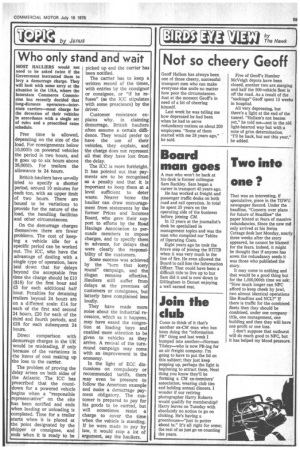Who only stand and wait
Page 61

If you've noticed an error in this article please click here to report it so we can fix it.
MOST HAULIERS would not need to be asked twice if the Government instructed them to levy a demurrage charge. They will look with some envy at the situation in the USA, where the Interstate Commerce Commission has recently decided that long-distance operators—interstate carriers—must charge for the detention of their vehicles in accordance with a single set of rules and a prescribed rates schedule.
Free time is allowed, depending on the size of the load. For consignments below 10,000lb on powered vehicles the period is two hours, and it goes up to six hours above 36,000lb. For trailers the allowance is 24 hours.
British hauliers have usually tried to specify a shorter period, around 10 minutes for each ton, with an upper limit of two hours. There are bound to be variations to provide for the nature of the load, the handling facilities and other circumstances.
On the demurrage charges themselves there are fewer problems. The cost of keeping a vehicle idle for a specific period can be worked out. The ICC, who have the advantage of dealing with a single type of operation, have laid down that for delays beyond the acceptable free time the charge should be £10 ($18) for the first hour and £5 for each additional half hour. Penalties for detaining trailers beyond 24 hours are on a different scale: £14 for each of the first and second 24 hours, £20 for each of the third and fourth periods, and £28 for each subsequent 24 hours.
Direct comparison with demurrage charges in the UK would •be misleading, if only because of the variations in the items of cost making up the loss to the carrier.
The problem of proving the delay arises on both sides of the Atlantic. The ICC has prescribed that the countdown for a powered vehicle begins when a "responsible representative" on the site has been notified and ends when loading or unloading is completed. Time for a trailer starts when it is placed at the point designated by the shipper or consignee, and ends when it is ready to be picked up and the carrier has been notified.
The carrier has to keep a 'written record of the times, with entries by the consignor or consignee, or "if he refuses" (as the ICC stipulates with some prescience) by the driver.
Customer resistance explains why, in claiming demurrage, British hauliers often assume a certain diffidence. They would prefer to have the use of their vehicles, they explain, and the charge does not represent all that they have lost from the delay.
The ICC is more forthright. It has pointed out that payments are to be recognised as a penalty and that it is important to keep them at a level sufficient to deter waste. Nearer home the haulier can draw encouragement from statements by the former Prices and Incomes Board, who gave their support to efforts by the Road Haulage Association to persuade members to impose charge's, and to specify them in advance, for delays that were clearly the responsibility of the customers.
Some success was achieved by the "turn that lorry round" campaign, and the slogan remains effective. Hauliers still suffer from delays at the premises of customers or consignees, but latterly have complained less loudly.
They have made more noise about the industrial recession, which as it happens, may have eased the congestion at loading bays and enabled more attention to be given to vehicles as they arrive. A revival of the turnround campaign may come with an improvement in the economy.
In the light of ECC discussions on compulsory or recommended tariffs, there may even be pressure to follow the American example and make a demurrage payment obligatory. The customer is prepared to pay for his goods to be carried, but will sometimes resist a charge to cover the time when the vehicle is standing. If he were made to pay by law, it would stop a lot of argument, say the hauliers.




































































































